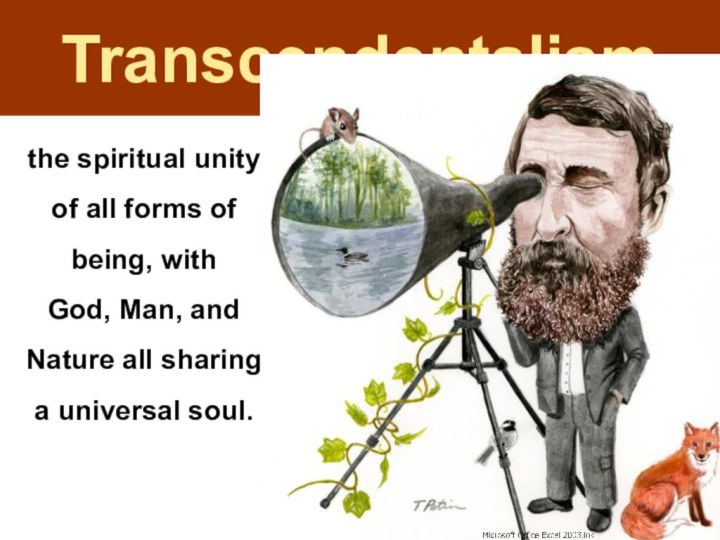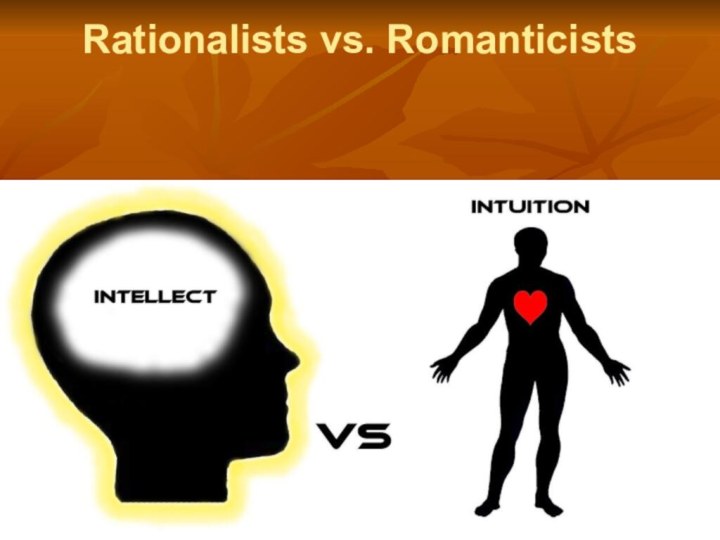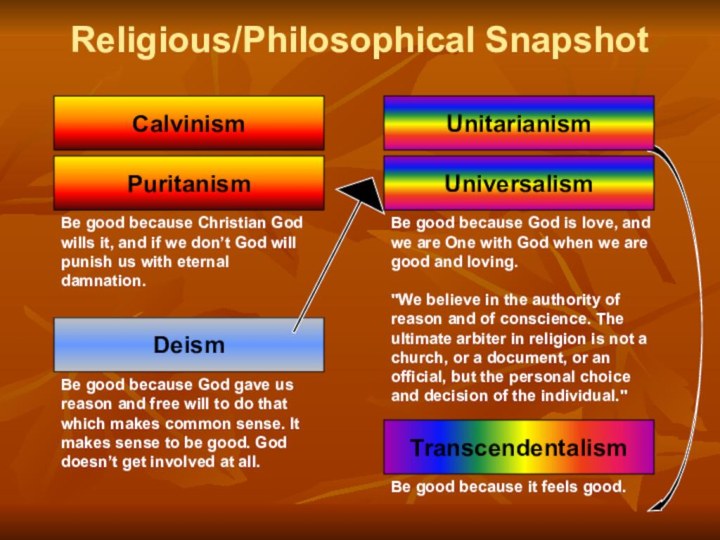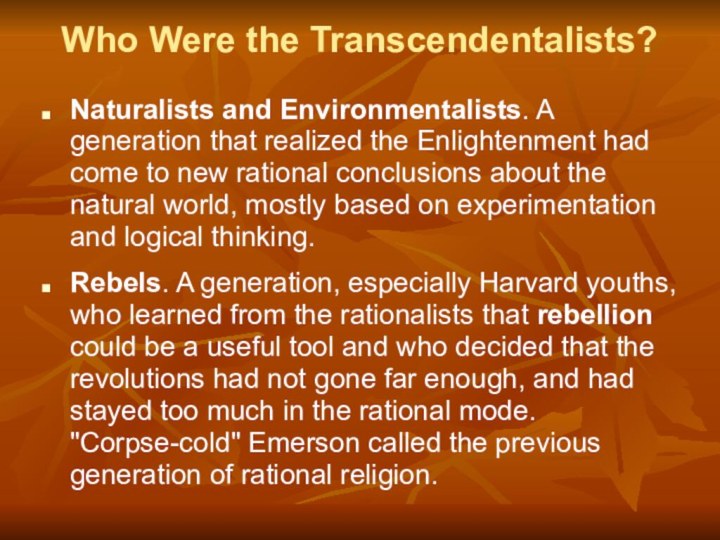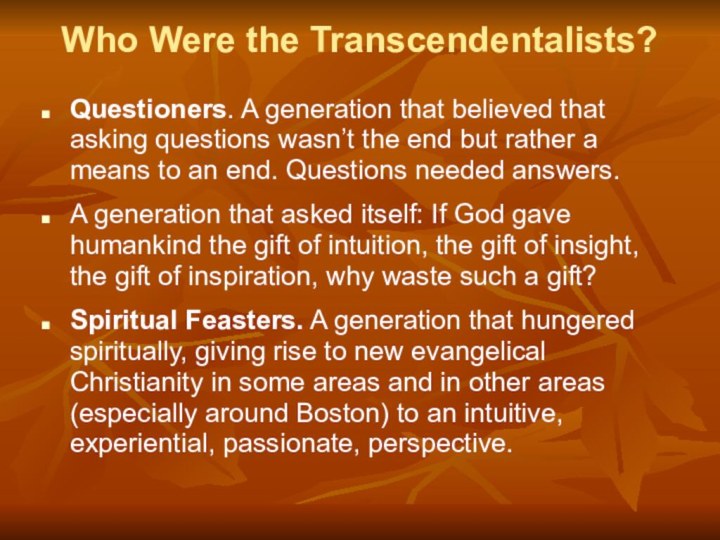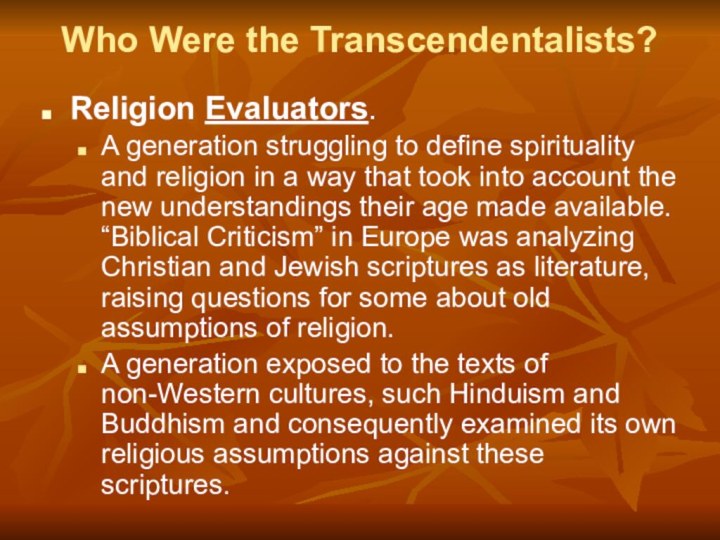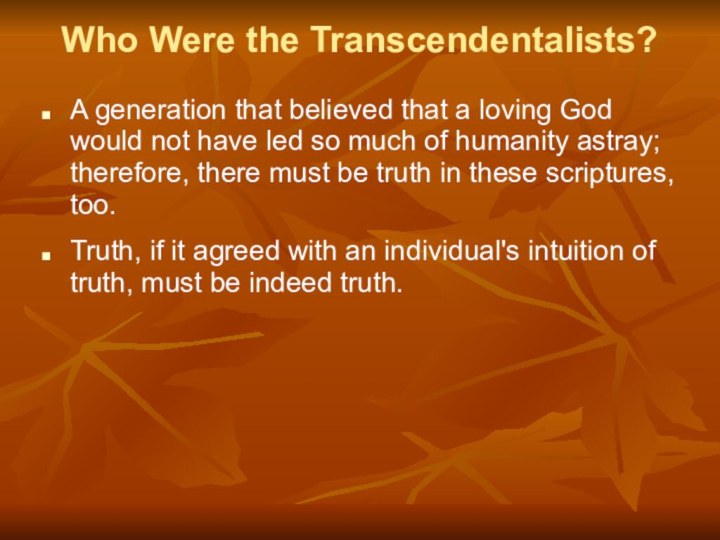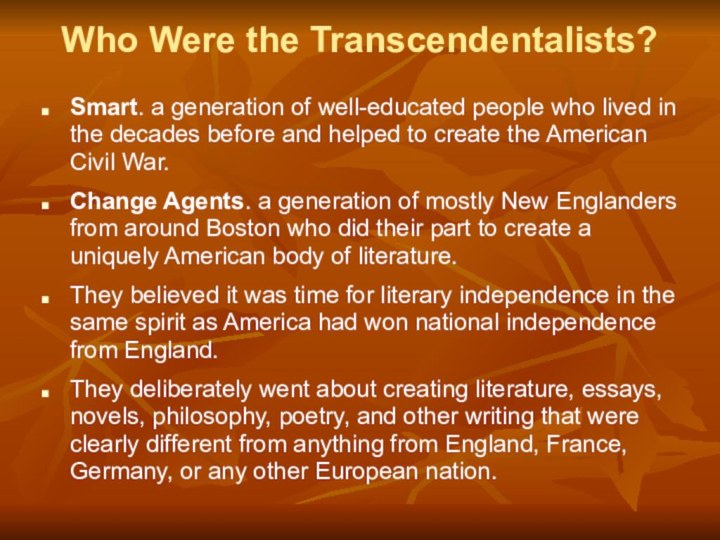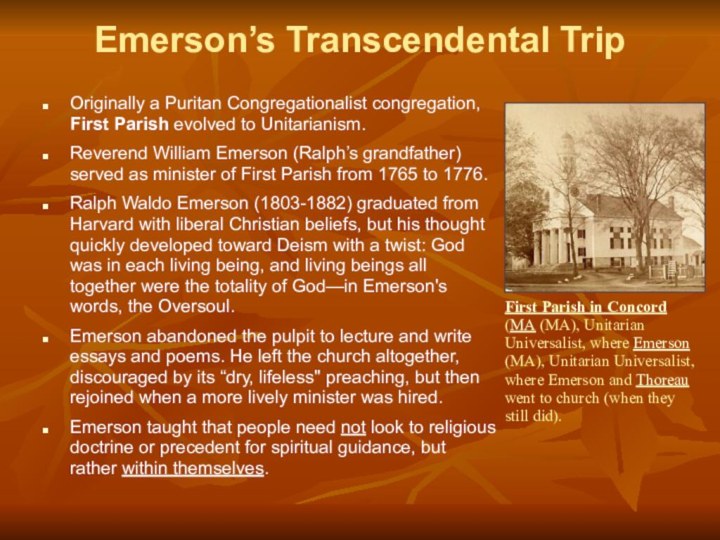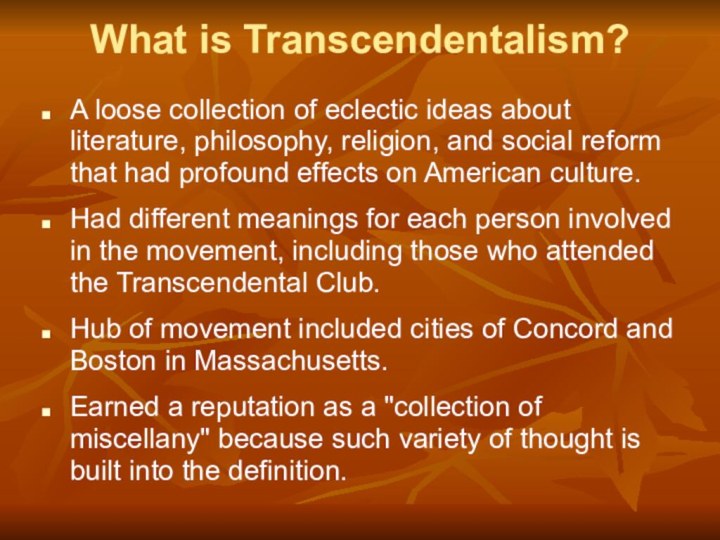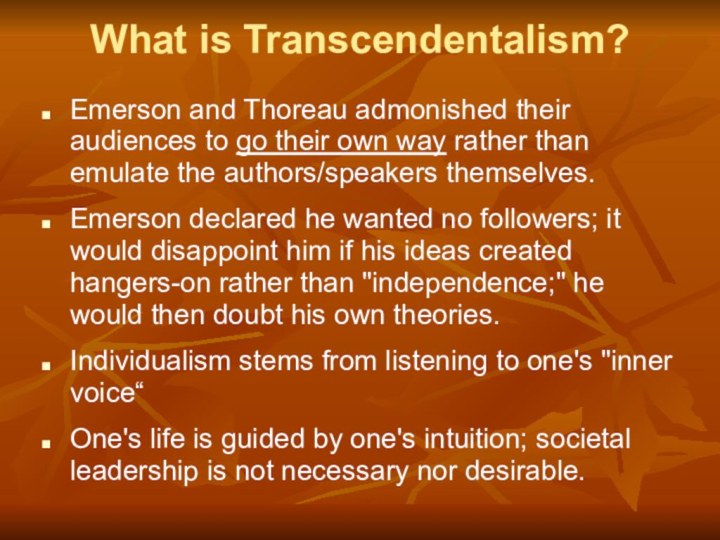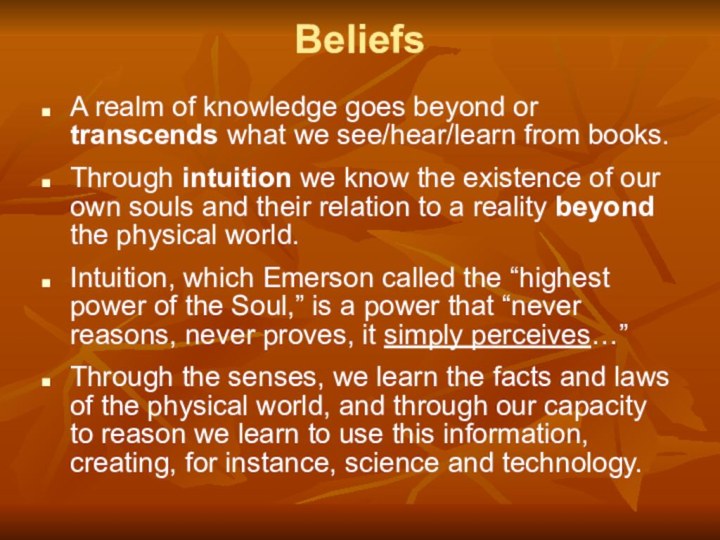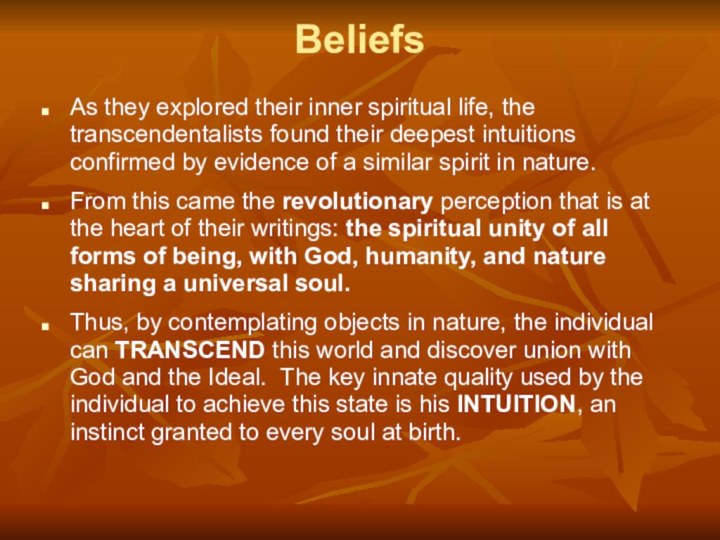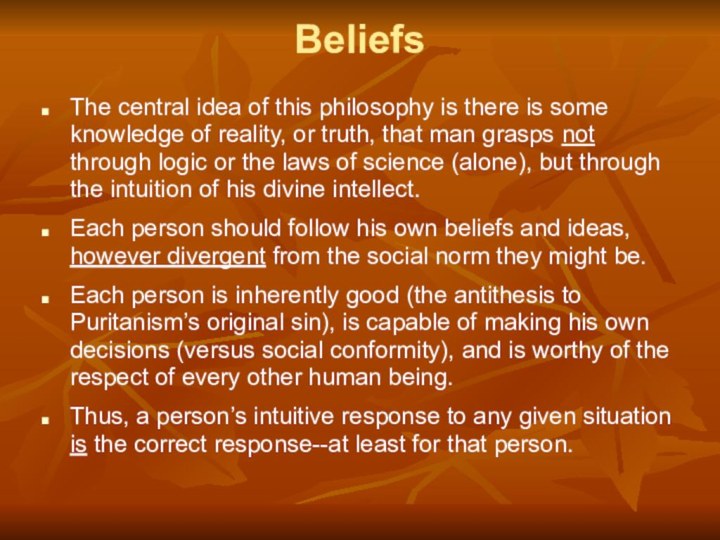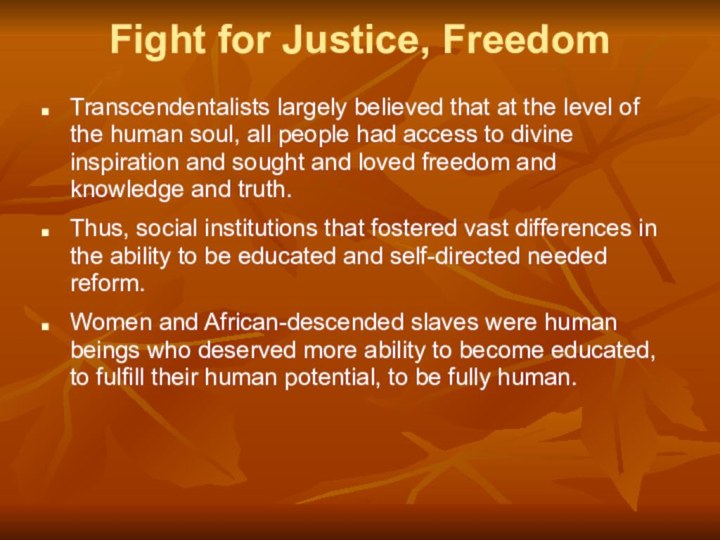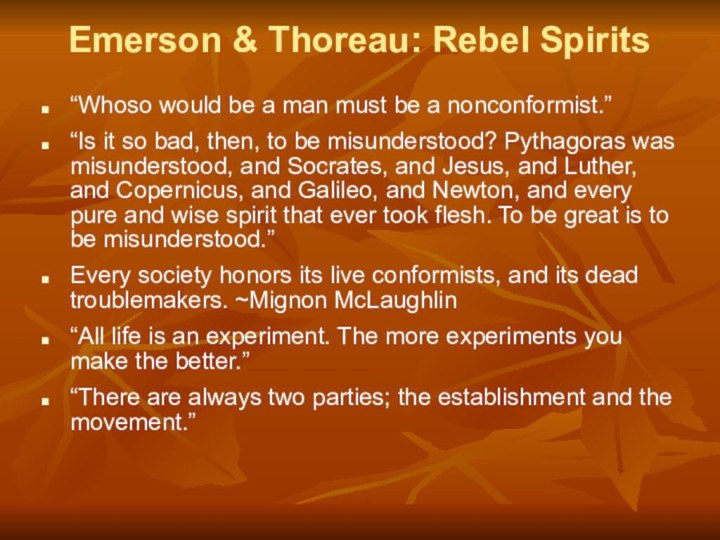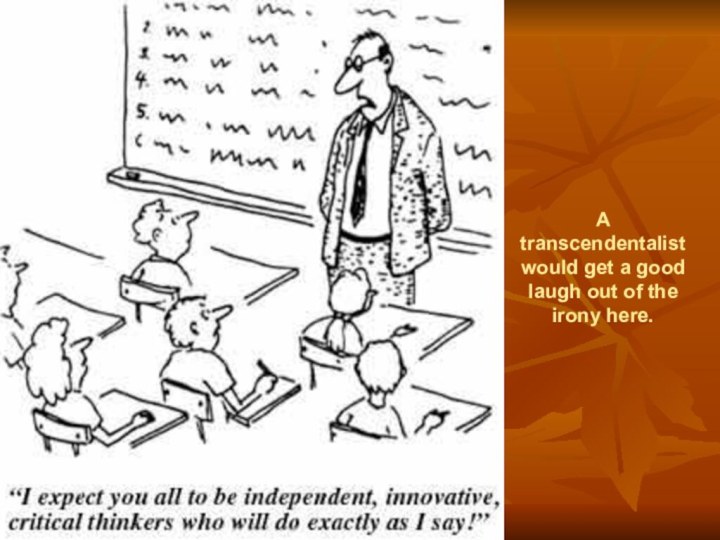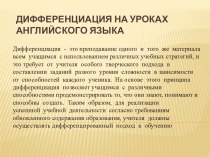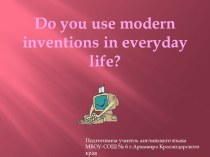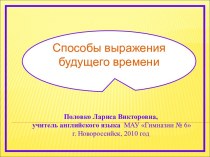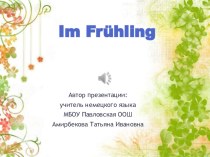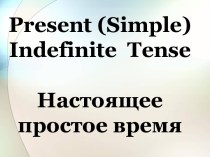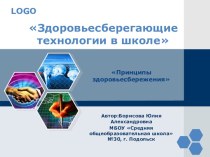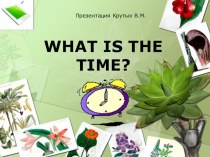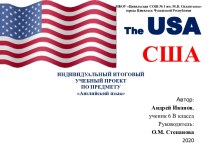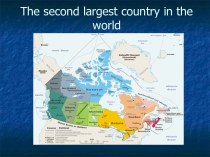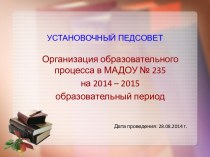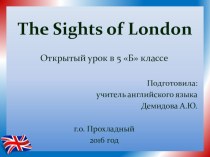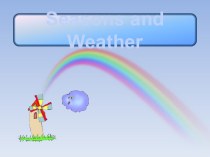Слайд 2
Rationalists vs. Romanticists
Слайд 3
Religious/Philosophical Snapshot
Calvinism
Transcendentalism
Be good because it feels good.
Be good
because Christian God wills it, and if we don’t
God will punish us with eternal damnation.
Be good because God is love, and we are One with God when we are good and loving.
"We believe in the authority of reason and of conscience. The ultimate arbiter in religion is not a church, or a document, or an official, but the personal choice and decision of the individual."
Deism
Be good because God gave us reason and free will to do that which makes common sense. It makes sense to be good. God doesn’t get involved at all.
Puritanism
Universalism
Unitarianism
Слайд 4
Who Were the Transcendentalists?
Naturalists and Environmentalists. A generation
that realized the Enlightenment had come to new rational
conclusions about the natural world, mostly based on experimentation and logical thinking.
Rebels. A generation, especially Harvard youths, who learned from the rationalists that rebellion could be a useful tool and who decided that the revolutions had not gone far enough, and had stayed too much in the rational mode. "Corpse-cold" Emerson called the previous generation of rational religion.
Слайд 5
Who Were the Transcendentalists?
Questioners. A generation that believed
that asking questions wasn’t the end but rather a
means to an end. Questions needed answers.
A generation that asked itself: If God gave humankind the gift of intuition, the gift of insight, the gift of inspiration, why waste such a gift?
Spiritual Feasters. A generation that hungered spiritually, giving rise to new evangelical Christianity in some areas and in other areas (especially around Boston) to an intuitive, experiential, passionate, perspective.
Слайд 6
Who Were the Transcendentalists?
Religion Evaluators.
A generation struggling
to define spirituality and religion in a way that
took into account the new understandings their age made available. “Biblical Criticism” in Europe was analyzing Christian and Jewish scriptures as literature, raising questions for some about old assumptions of religion.
A generation exposed to the texts of non-Western cultures, such Hinduism and Buddhism and consequently examined its own religious assumptions against these scriptures.
Слайд 7
Who Were the Transcendentalists?
A generation that believed that
a loving God would not have led so much
of humanity astray; therefore, there must be truth in these scriptures, too.
Truth, if it agreed with an individual's intuition of truth, must be indeed truth.
Слайд 8
Who Were the Transcendentalists?
Smart. a generation of well-educated
people who lived in the decades before and helped
to create the American Civil War.
Change Agents. a generation of mostly New Englanders from around Boston who did their part to create a uniquely American body of literature.
They believed it was time for literary independence in the same spirit as America had won national independence from England.
They deliberately went about creating literature, essays, novels, philosophy, poetry, and other writing that were clearly different from anything from England, France, Germany, or any other European nation.
Слайд 9
Emerson’s Transcendental Trip
Originally a Puritan Congregationalist congregation, First
Parish evolved to Unitarianism.
Reverend William Emerson (Ralph’s grandfather) served
as minister of First Parish from 1765 to 1776.
Ralph Waldo Emerson (1803-1882) graduated from Harvard with liberal Christian beliefs, but his thought quickly developed toward Deism with a twist: God was in each living being, and living beings all together were the totality of God—in Emerson's words, the Oversoul.
Emerson abandoned the pulpit to lecture and write essays and poems. He left the church altogether, discouraged by its “dry, lifeless" preaching, but then rejoined when a more lively minister was hired.
Emerson taught that people need not look to religious doctrine or precedent for spiritual guidance, but rather within themselves.
First Parish in Concord (MA (MA), Unitarian Universalist, where Emerson (MA), Unitarian Universalist, where Emerson and Thoreau went to church (when they still did).
Слайд 10
Thoreau’s Transcendental Trip
Graduated from Harvard College in 1837,
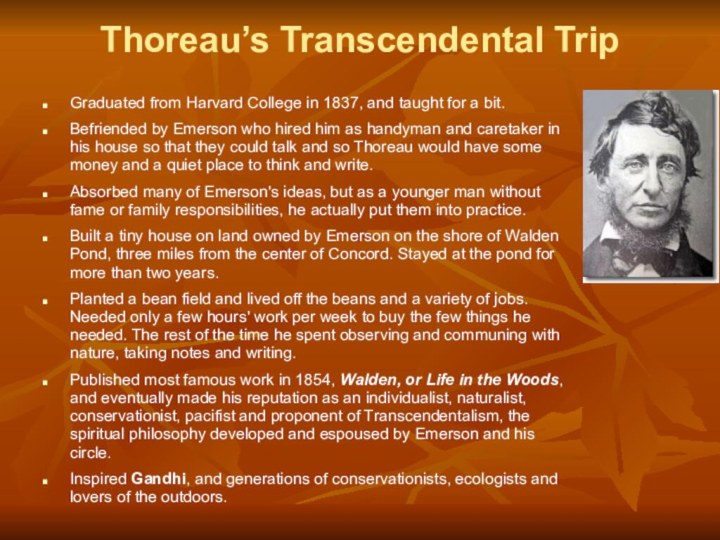
and taught for a bit.
Befriended by Emerson who hired
him as handyman and caretaker in his house so that they could talk and so Thoreau would have some money and a quiet place to think and write.
Absorbed many of Emerson's ideas, but as a younger man without fame or family responsibilities, he actually put them into practice.
Built a tiny house on land owned by Emerson on the shore of Walden Pond, three miles from the center of Concord. Stayed at the pond for more than two years.
Planted a bean field and lived off the beans and a variety of jobs. Needed only a few hours' work per week to buy the few things he needed. The rest of the time he spent observing and communing with nature, taking notes and writing.
Published most famous work in 1854, Walden, or Life in the Woods, and eventually made his reputation as an individualist, naturalist, conservationist, pacifist and proponent of Transcendentalism, the spiritual philosophy developed and espoused by Emerson and his circle.
Inspired Gandhi, and generations of conservationists, ecologists and lovers of the outdoors.
Слайд 11
What is Transcendentalism?
A loose collection of eclectic ideas
about literature, philosophy, religion, and social reform that had
profound effects on American culture.
Had different meanings for each person involved in the movement, including those who attended the Transcendental Club.
Hub of movement included cities of Concord and Boston in Massachusetts.
Earned a reputation as a "collection of miscellany" because such variety of thought is built into the definition.
Слайд 12
What is Transcendentalism?
Emerson and Thoreau admonished their audiences
to go their own way rather than emulate the
authors/speakers themselves.
Emerson declared he wanted no followers; it would disappoint him if his ideas created hangers-on rather than "independence;" he would then doubt his own theories.
Individualism stems from listening to one's "inner voice“
One's life is guided by one's intuition; societal leadership is not necessary nor desirable.
Слайд 13
Beliefs
A realm of knowledge goes beyond or transcends
what we see/hear/learn from books.
Through intuition we know
the existence of our own souls and their relation to a reality beyond the physical world.
Intuition, which Emerson called the “highest power of the Soul,” is a power that “never reasons, never proves, it simply perceives…”
Through the senses, we learn the facts and laws of the physical world, and through our capacity to reason we learn to use this information, creating, for instance, science and technology.
Слайд 14
Beliefs
As they explored their inner spiritual life, the
transcendentalists found their deepest intuitions confirmed by evidence of
a similar spirit in nature.
From this came the revolutionary perception that is at the heart of their writings: the spiritual unity of all forms of being, with God, humanity, and nature sharing a universal soul.
Thus, by contemplating objects in nature, the individual can TRANSCEND this world and discover union with God and the Ideal. The key innate quality used by the individual to achieve this state is his INTUITION, an instinct granted to every soul at birth.
Слайд 15
Beliefs
The central idea of this philosophy is there
is some knowledge of reality, or truth, that man
grasps not through logic or the laws of science (alone), but through the intuition of his divine intellect.
Each person should follow his own beliefs and ideas, however divergent from the social norm they might be.
Each person is inherently good (the antithesis to Puritanism’s original sin), is capable of making his own decisions (versus social conformity), and is worthy of the respect of every other human being.
Thus, a person’s intuitive response to any given situation is the correct response--at least for that person.
Слайд 16
Fight for Justice, Freedom
Transcendentalists largely believed that at
the level of the human soul, all people had
access to divine inspiration and sought and loved freedom and knowledge and truth.
Thus, social institutions that fostered vast differences in the ability to be educated and self-directed needed reform.
Women and African-descended slaves were human beings who deserved more ability to become educated, to fulfill their human potential, to be fully human.
Слайд 17
Emerson & Thoreau: Rebel Spirits
“Whoso would be a
man must be a nonconformist.”
“Is it so bad, then,
to be misunderstood? Pythagoras was misunderstood, and Socrates, and Jesus, and Luther, and Copernicus, and Galileo, and Newton, and every pure and wise spirit that ever took flesh. To be great is to be misunderstood.”
Every society honors its live conformists, and its dead troublemakers. ~Mignon McLaughlin
“All life is an experiment. The more experiments you make the better.”
“There are always two parties; the establishment and the movement.”
Слайд 18
A transcendentalist would get a good laugh out
of the irony here.
